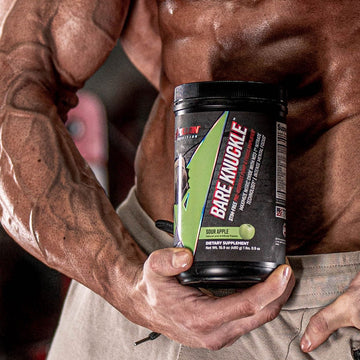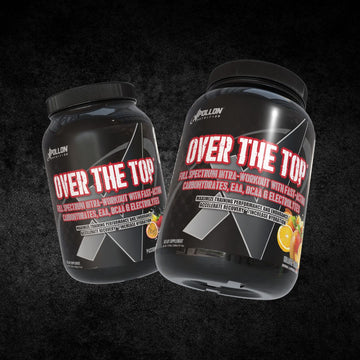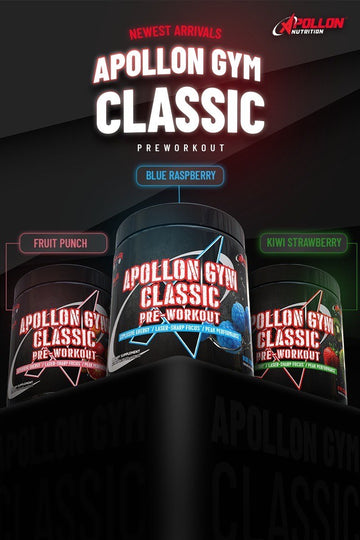Bare Knuckle V4 dropped just a few weeks ago, and as we turn the page on 2021 and welcome 2022, we’re adding a new flavor to the lineup with ROOT BEER.
We’ve discussed the ins and outs of the new Bare Knuckle V4, but today we’d like to do a deep dive into the ingredient truly separates Bare Knuckle from all other non-stimulant pre workouts on the market -- 3,000 mg of Arginine Nitrate (as NO3-T®).
To understand why Arginine Nitrate is such a top-tier addition to the new Bare Knuckle, it first helps to understand how your body produces nitric oxide. As you know, nitric oxide is an supremely important signaling molecule in the body that plays a critical role in athletic performance impacting things such as:
- Vasodilatation (widening of blood vessels to allow for greater blood flow, and subsequently muscle pumps)
- Mitochondrial respiration (the production of ATP)
- Skeletal muscle contractility
- Fatigue development (how quickly you feel gassed during a set)
- Glucose and calcium (Ca2+) homeostasis
Basically, greater nitric oxide availability supports increased athletic performance (not to mention a more savage pump!). However, nitric oxide is highly unstable and has a very short half-life, which means the body is constantly needing to produce it. To generate nitric oxide, the body can utilize two different pathways.
The most common one utilized by supplement brands is the Citrulline → Arginine → Nitric Oxide pathway.
This pathway works very well and is supported by ingredients such as:
- Citrulline (which is included in both HOOLIGAN and BARE KNUCKLE)
- Nitrosigine (which can be found in BLOODY HELL)
- CellFlo6 as well as other polyphenol sources (e.g. grape seed extract, pomegranate powder, etc.) that stimulate eNOS (the enzyme that catalyzes nitric oxide production
The less frequently utilized pathway for NO generation in the body is the Nitrate→Nitrite→Nitric oxide pathway.
There are numerous sources of dietary nitrate, including leafy green vegetables like spinach, arugula and kale, as well as beetroot. However, the amount of these foods (1-2 lbs worth!) that you would have to consume to get a meaningful quantity (i.e. an amount that would actually improve performance) is rather substantial and could lead to GI distress during training.
As such, researchers have looked for other ways to increase nitrate intake prior to exercise. The most commonly used method is to consume beetroot juice.
However, there is considerable discrepancy between the actual nitrate content of beetroot juice. It can vary from one product to the next as well as differ between batches from the same supplier, leading to inconsistencies. Plus, beet juice isn’t the most palate-pleasing beverage on the market.
This is where supplemental nitrates come to the rescue. Amino-bound nitrates, like NO3-T Arginine Nitrate, provide a reliable source of dietary nitrate that supply a consistent amount of NO3- in every serving.
One thing to keep in mind with nitrates is that they take some time to work. Whereas you may be used to slamming your pre workout 15 minutes before hitting the gym, nitrates take 60-90 minutes to exert their full effects, and there is some research to indicate that daily supplementation with it may lead to prolonged increases in nitric oxide.[1]
The bottom line here is that if you want to maximize the potential benefits of nitrate supplements on your workouts, take them at least 60 minutes ahead of time.
How Do Nitrates Improve Exercise Performance?
Now that we’ve covered the basics of nitric oxide production, let’s get to the real reason you’re interested in nitrates -- increasing athletic performance. Nitrates support greater athletic performance in a number of ways:
Increases Oxygen Delivery to Muscles
Nitrates are converted to nitrite, which are then ultimately converted to nitric oxide. This encourages vasodilation (the widening of blood vessels), which allows for greater blood flow and oxygen to muscle cells. The more nutrient-rich blood that muscles receive, the higher their performance will be as will their recovery between sets.
Reduces Oxygen Cost of Exercise
Oxygen plays a key role in energy production, and (in most cases) the greater output of work (i.e. the harder you train) the greater demand/requirement there is for oxygen.
Nitrates can reduce the oxygen cost of mitochondrial ATP resynthesis via an increased number of ATP molecules formed per oxygen molecules consumed in the electron transport chain.[2]
Other research points to nitrate supplementation improving endurance. Several studies have been conducted showing that nitrate supplementation prior to exercise lowers the oxygen cost during exercise, which means that the muscles need less oxygen to perform the same amount of work.
Much like money, less oxygen consumed during exercise increases the economy of your muscles, giving you more bang for your buck. You’ll be able to exercise to the same degree you were previously without feeling as drained following your workouts.
Improves Muscle Contractility Efficiency
Nitrates can enhance performance by improving the efficiency of muscle contractility. This occurs by reduced creatine phosphate cost of force production and alterations in calcium ion metabolism in muscle cells.
Basically, nitrates help the muscles “get more for less.” This can help you to train harder for longer in the gym, ultimately making better gains in size and strength.
Supports Cardiovascular Health
Nitrates have also been found to support cardiovascular health via reducing blood pressure and improving endothelial function.[4]
Takeaway
To sum things up, nitrates can be a powerful supplement both for enhancing exercise performance and supporting cardiovascular health.
To date, research indicates that nitrates can[3,4,5,6,7,8,9,12]:
- Improve blood flow
- Reduce oxygen cost when exercising
- Increase force and power production
- Boost endurance
- Generate long-lasting nitric oxide boosts and muscle pumps
- Enhance recovery at the cellular level
- Increase overall lifting volume
Bare Knuckle provides a massive 3,000mg dose of Arginine Nitrate (as NO3-T) which also offers one lesser-known benefit. A number of studies find that that pairing arginine with nitrate allows for[10,11]:
- better absorption and uptake
- Improved vasodilation
- reduced nitrate tolerance
And, don’t forget that Bare Knuckle ALSO includes 8,000mg L-Citrulline and 1,500mg Agmatine Sulfate to provide comprehensive nitric oxide support, leading to greater performance and stronger, longer-lasting pumps!
References
- Vanhatalo A, Bailey SJ, Blackwell JR et al. Acute and chronic effects of dietary nitrate supplementation on blood pressure and the physiological responses to moderate-intensity and incremental exercise. Am J Physiol Regul Integr Comp Physiol. 2010 Oct 1;299(4):R1121–31.
- Larsen F.J., Schiffer T.A., Borniquel S., Sahlin K., Ekblom B., Lundberg J.O., Weitzberg E. Dietary inorganic nitrate improves mitochondrial efficiency in humans. Cell Metab. 2011;13:149–159. doi: 10.1016/j.cmet.2011.01.004.
- Bailey S.J., Fulford J., Vanhatalo A., Winyard P.G., Blackwell J.R., DiMenna F.J., Wilkerson D.P., Benjamin N., Jones A.M. Dietary nitrate supplementation enhances muscle contractile efficiency during knee-extensor exercise in humans. J. Appl. Physiol. 2010;109:135–148. doi: 10.1152/japplphysiol.00046.2010.
- Larsen F.J., Ekblom B., Sahlin K., Lundberg J.O., Weitzberg E. Effects of dietary nitrate on blood pressure in healthy volunteers. N. Engl. J. Med. 2006;355:2792–2793. doi: 10.1056/NEJMc062800.
- Larsen, F; “Effects of dietary nitrate on oxygen cost during exercise”; Department of Physiology and Pharmacology, Karolinska Institutet; 2007
- Lansley, K; “Dietary nitrate supplementation reduces the O2 cost of walking and running: a placebo-controlled study”; School of Sport and Health Sciences, Univ. of Exeter; 2011
- Bailey, S; “Dietary nitrate supplementation reduces the O2 cost of low-intensity exercise and enhances tolerance to high-intensity exercise in humans”; School of Sport and Health Sciences, Univ. of Exeter; 2009
- Bescos, R; “Acute administration of inorganic nitrate reduces VO(2peak) in endurance athletes”; National Institute of Physical Education-Barcelona, University of Barcelona; 2011; https://pubmed.ncbi.nlm.nih.gov/21407132/
- Fulford, J; “Influence of dietary nitrate supplementation on human skeletal muscle metabolism and force production during maximum voluntary contractions”; NIHR Exeter Clinical Research Facility, University of Exeter Medical School; 2013; https://pubmed.ncbi.nlm.nih.gov/23354414/
- MacAllister, R, et. al; “Arginine and nitrate tolerance”; British Journal of Pharmacology; May 2000
- Leaf CD, Wishnok JS, Hurley JP, Rosenblad WD, Fox JG, Tannenbaum SR. Nitrate biosynthesis in rats, ferrets and humans. Precursor studies with L-arginine. Carcinogenesis. 1990 May;11(5):855-8. doi: 10.1093/carcin/11.5.855. PMID: 2335012.
- Galvan E, O'Connor A, Goodenough YC, et al. Effects of 28 days of two creatine nitrate based dietary supplements on bench press power in recreationally active males. J Int Soc Sports Nutr. 2015;12(Suppl 1):P17. Published 2015 Sep 21. doi:10.1186/1550-2783-12-S1-P17







It’s really a nice and helpful piece of info. I am haplpy that you imply
shared this useful information with us. Please stay
us up to date like this. Thank you for sharing. https://telegra.ph/Na-chto-nuzhno-smotret-chtoby-vybrat-onlajn-kazino-v-kotorom-budet-komfortno-igrat-12-22